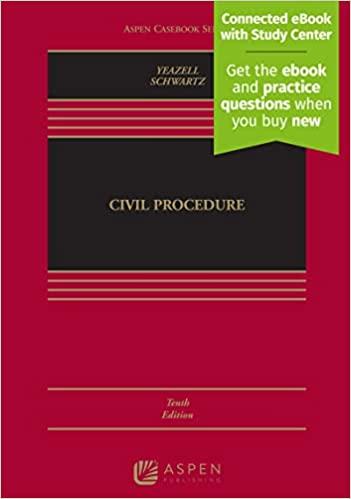Question
Step-by-step explanation 1. As per the rules of professional conduct, an advertisement means a public or private communication made by or on behalf of a
Step-by-step explanation
1. As per the rules of professional conduct, an advertisement means a public or private communication made by or on behalf of a lawyer or law firm about the lawyer or law firm's services. And, solicitation means an advertisement initiated by or on behalf of the lawyer of law firm that is targeted to a specific recipient or their family members or legal representatives. In this case, I found that Alex is not violating any ethical rules because he was not promoting himself or his firm but he spread awareness regarding the rights and responsibilities in the foreclosure process. However, his intention was to get more clients but he was not promoting his firm because the brochure contains information of foreclosure process and statistical data of foreclosures national and locally and his contact number and his photography. If he mentions his area of practice then only this can be considered as solicitation or advertisement but in the given situation it's not.
2. Yes, these group particularly be seen as vulnerable group because these people can be exposed to the possibility of being attacked or harmed, either physically or emotionally or financially.
3. No, it does not place higher ethical burden on Alex because he was not marketing of legal services to them, he was just providing their rights and responsibilities in the foreclosure process. In short, he was acting ethically by spreading awareness to the people those have problem in the foreclosure process, he was providing information to them so that they have defend themselves from the wrong foreclosure and no one can take unfair advantage of that vulnerable group.
1. No, this cannot be considered as discrimination.
2. No, it cannot be actionable by Alex's clients because it's completely up to the lawyer as to whom he wants to charge and when to charge, either prior to the rendering of the services or after the services are rendered. Hence, you cannot declare this action as illegal discrimination as it is also up to the client. A client may not pay before the services are rendered if they want to go for another lawyer for the services. Every lawyer has discretion to decide the way how he gets paid and when to receive the fees..
Step by Step Solution
There are 3 Steps involved in it
Step: 1

Get Instant Access to Expert-Tailored Solutions
See step-by-step solutions with expert insights and AI powered tools for academic success
Step: 2

Step: 3

Ace Your Homework with AI
Get the answers you need in no time with our AI-driven, step-by-step assistance
Get Started


